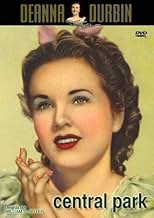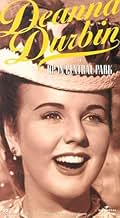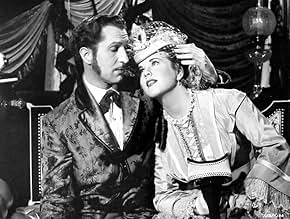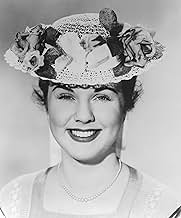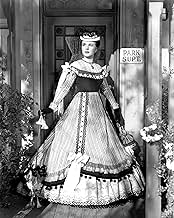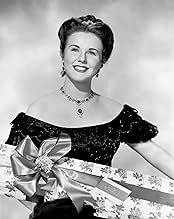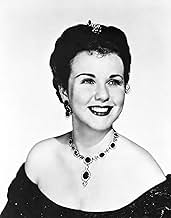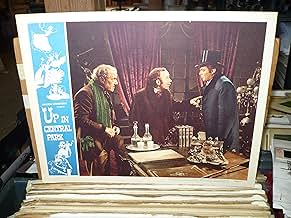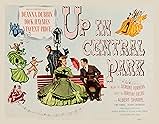AVALIAÇÃO DA IMDb
6,0/10
278
SUA AVALIAÇÃO
Adicionar um enredo no seu idiomaA newspaper reporter and the daughter of an immigrant maintenance man help expose political corruption in New York City.A newspaper reporter and the daughter of an immigrant maintenance man help expose political corruption in New York City.A newspaper reporter and the daughter of an immigrant maintenance man help expose political corruption in New York City.
Nellie Fisher
- Dancer
- (as Nelle Fisher)
Boyd Ackerman
- Policeman
- (não creditado)
Patricia Alphin
- Guest
- (não creditado)
Alice Backes
- Swedish Immigrant Girl
- (não creditado)
G. Pat Collins
- Ward Heeler
- (não creditado)
Enredo
Você sabia?
- CuriosidadesDuring filming, sepia (brownish) tone was tested in a few scenes, but the released picture is entirely in standard black and white.
- Erros de gravaçãoWhen Timothy Moore is learning to read , he reads from Beatrix Potter's Tale of Peter Rabbit , which wasn't published until 1902 .
- Trilhas sonorasOh Say, Can You See (What I See)
(uncredited)
Music by Sigmund Romberg
Lyrics by Dorothy Fields
Sung by Deanna Durbin
Avaliação em destaque
UP IN CENTRAL PARK (Universal-International, 1948), directed by William A. Seiter, stars Deanna Durbin in her next to last movie of her career. For her first 1948 release, she stars in a light-hearted period piece based on a popular 1945 musical play of the same name by Dorothy and Herbert Fields. Aside from some changes from stage to screen regarding both story and selected song tunes, the film in general is livably typical Durbin material which allows her to change from teenage Irish girl in pig-tails to attractive young woman. What's most interesting here is casting Durbin opposite Vincent Price (then not quite the horror film actor he was to become years later) in his rare occasion cast in a musical story. Though Price would have done very well in the singing category, all major vocals go to the pleasing voices by Durbin and 20th Century-Fox alumni, Dick Haymes.
In spite of the title, the 88 minute story is not set entirely in Central Park. However, it takes place in 1870s New York City where the plot introduces William Marcy Treed (Vincent Price), a corrupt political boss of the Tammany Hall Society advocating the re- election of weak and drunken candidate, Mayor Oakley (Hobart Cavanaugh,) back in office so to resume his crooked deals. Going against Treed is New York Times reporter John Matthews (Dick Haymes) out to expose him, but because of his lack of evidence that would stand up on court, he's unable to do so. Later on a boat arriving from Europe to Ellis Island are immigrants, including that of Rosie (Deanna Durbin) and her widower father, Timothy Moore (Arthur Sharpe) coming to their land of opportunity where Rosie hopes to become a great opera singer. Soon after, Mr. Moore is met by Regan (Tom Powers), one of Tweed's associates offering naive immigrants extra money voting straight candidate tickets under names of those unable to cast a ballot, namely the sick and deceased, even without being American citizens. Offered $2 a vote, Mr. Moore earns $50 for voting 23 times for Oakley. Having fallen asleep in Tweed's office while awaiting to meet with him, Treed, believing Rosie has overheard him discussing with the board about embezzling funds through unnecessary renovation of Central Park, gets on her good graces by offering her father a $3,000 a year job as park superintendent plus living accommodations inside Central Park. As much as Rosie feels Tread to be a great man of honor, it's up to Matthews, who has taken an interest in the young lady, to convince her otherwise.
With music and lyrics by Sigmund Romberg and Dorothy Fields, the motion picture soundtrack is as follows: "Vote for Treed" (sung by candidates); "Oh Say Do You See What I See" (sung by Deanna Durbinb); "Carousel in the Park" (sung by Dick Haymes and Deanna Durbin); "The Ice Skating Ballet" (photograph come to life sequence choreographed by Helen Tamiras); "When She Walks in the Room" (sung by Dick Haymes); "Pace, Pace Mio Mio" and Giuseppe Verdi's Opera LA FORZE DEL DESTINO (sung by Durbin); and "The Waiter/Can-Can Dance" (instrumental). Though the songs are proved satisfactory, including Durbin's "Oh Say Do You See" number and a couple of Dick Haymes song interludes, they are, in the most part, unmemorable.
While the legacy of Universal Studio rests mostly on its reputation for horror films and/or Abbott and Costello comedies, one of the biggest money makers for the studio since 1936 were those films starring Deanna Durbin. Making no attempt speaking with an Irish brogue, which is left to the Barry Fitzgerald sounding voice of co-star, Arthur Sharpe, Durbin's Rosie is less typical Irish stereotype than most, though her Irish temper does flare up on a couple of occasions with her giving face slaps to those who make her angry. When watching Durbin playing opposite Vincent Price, one would have to feel their missed opportunity for not being cast together in the sound remake of THE PHANTOM OF THE OPERA (1943), in place of the casting of Susanna Foster and Claude Rains. Interestingly with this combination for UP IN CENTRAL PARK that Price presence gathers the most attention with his scene stealing performance, while Arthur Sharpe gets some moments to himself in a scene where he attempts to get his education by learning to read by attending school seated in a classroom surrounded by third grade students.
A satisfactory presentation with authentic recreated costumes and settings that blend in perfectly with its time frame, it's a wonder why it wasn't produced in Technicolor. Though UP IN CENTRAL PARK did have some limited TV revivals in the 1980s, especially on public broadcasting television, it did become available on video cassette in 1998 and years later on DVD as part of the Deanna Durbin collection, simply indicating the Durbin name isn't as unknown or forgotten as legend may have it believed to be. (***)
In spite of the title, the 88 minute story is not set entirely in Central Park. However, it takes place in 1870s New York City where the plot introduces William Marcy Treed (Vincent Price), a corrupt political boss of the Tammany Hall Society advocating the re- election of weak and drunken candidate, Mayor Oakley (Hobart Cavanaugh,) back in office so to resume his crooked deals. Going against Treed is New York Times reporter John Matthews (Dick Haymes) out to expose him, but because of his lack of evidence that would stand up on court, he's unable to do so. Later on a boat arriving from Europe to Ellis Island are immigrants, including that of Rosie (Deanna Durbin) and her widower father, Timothy Moore (Arthur Sharpe) coming to their land of opportunity where Rosie hopes to become a great opera singer. Soon after, Mr. Moore is met by Regan (Tom Powers), one of Tweed's associates offering naive immigrants extra money voting straight candidate tickets under names of those unable to cast a ballot, namely the sick and deceased, even without being American citizens. Offered $2 a vote, Mr. Moore earns $50 for voting 23 times for Oakley. Having fallen asleep in Tweed's office while awaiting to meet with him, Treed, believing Rosie has overheard him discussing with the board about embezzling funds through unnecessary renovation of Central Park, gets on her good graces by offering her father a $3,000 a year job as park superintendent plus living accommodations inside Central Park. As much as Rosie feels Tread to be a great man of honor, it's up to Matthews, who has taken an interest in the young lady, to convince her otherwise.
With music and lyrics by Sigmund Romberg and Dorothy Fields, the motion picture soundtrack is as follows: "Vote for Treed" (sung by candidates); "Oh Say Do You See What I See" (sung by Deanna Durbinb); "Carousel in the Park" (sung by Dick Haymes and Deanna Durbin); "The Ice Skating Ballet" (photograph come to life sequence choreographed by Helen Tamiras); "When She Walks in the Room" (sung by Dick Haymes); "Pace, Pace Mio Mio" and Giuseppe Verdi's Opera LA FORZE DEL DESTINO (sung by Durbin); and "The Waiter/Can-Can Dance" (instrumental). Though the songs are proved satisfactory, including Durbin's "Oh Say Do You See" number and a couple of Dick Haymes song interludes, they are, in the most part, unmemorable.
While the legacy of Universal Studio rests mostly on its reputation for horror films and/or Abbott and Costello comedies, one of the biggest money makers for the studio since 1936 were those films starring Deanna Durbin. Making no attempt speaking with an Irish brogue, which is left to the Barry Fitzgerald sounding voice of co-star, Arthur Sharpe, Durbin's Rosie is less typical Irish stereotype than most, though her Irish temper does flare up on a couple of occasions with her giving face slaps to those who make her angry. When watching Durbin playing opposite Vincent Price, one would have to feel their missed opportunity for not being cast together in the sound remake of THE PHANTOM OF THE OPERA (1943), in place of the casting of Susanna Foster and Claude Rains. Interestingly with this combination for UP IN CENTRAL PARK that Price presence gathers the most attention with his scene stealing performance, while Arthur Sharpe gets some moments to himself in a scene where he attempts to get his education by learning to read by attending school seated in a classroom surrounded by third grade students.
A satisfactory presentation with authentic recreated costumes and settings that blend in perfectly with its time frame, it's a wonder why it wasn't produced in Technicolor. Though UP IN CENTRAL PARK did have some limited TV revivals in the 1980s, especially on public broadcasting television, it did become available on video cassette in 1998 and years later on DVD as part of the Deanna Durbin collection, simply indicating the Durbin name isn't as unknown or forgotten as legend may have it believed to be. (***)
- lugonian
- 21 de jan. de 2016
- Link permanente
Principais escolhas
Faça login para avaliar e ver a lista de recomendações personalizadas
Detalhes
- Data de lançamento
- País de origem
- Idioma
- Também conhecido como
- Up in Central Park
- Locações de filme
- Empresa de produção
- Consulte mais créditos da empresa na IMDbPro
- Tempo de duração1 hora 24 minutos
- Cor
- Proporção
- 1.37 : 1
Contribua para esta página
Sugerir uma alteração ou adicionar conteúdo ausente

Principal brecha
By what name was Um Sonho Desfeito (1948) officially released in India in English?
Responda
